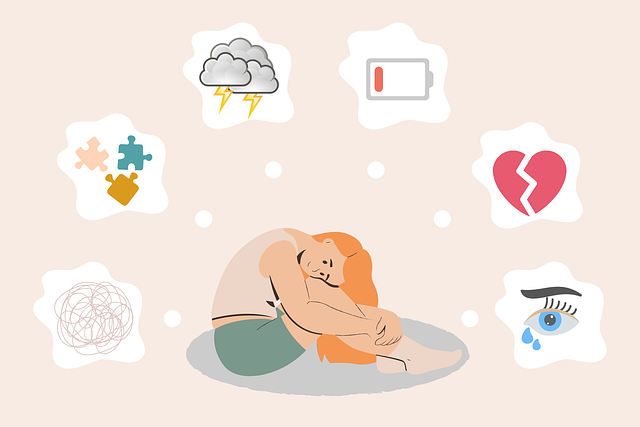Introduction: When Doubt Takes Over Love
Falling in love is supposed to be joyful — full of connection, laughter, and warmth. But for some people, love feels like walking through a maze of endless doubt and anxiety. You question your feelings, your partner’s love, and even the relationship itself. You might think, “What if they’re not the one?” or “What if I don’t really love them enough?”

If these thoughts replay over and over, causing distress, guilt, or confusion, you might be experiencing Relationship OCD (ROCD) — a lesser-known form of obsessive-compulsive disorder that centers on romantic relationships.
While occasional doubts in love are normal, ROCD transforms them into obsessive patterns that consume mental energy and emotional peace. It’s not about being indecisive or dramatic — it’s about living with intrusive thoughts that feel uncontrollable and frightening.
In this article, we’ll explore what ROCD really is, how it differs from general OCD, what its symptoms look like, and how people can recover and rebuild healthy relationships.
What Is Relationship OCD (ROCD)?
Relationship OCD (ROCD) is a subtype of obsessive-compulsive disorder where intrusive thoughts and doubts focus on romantic relationships. People with ROCD experience obsessive fears about their partner’s worthiness, the relationship’s quality, or their own feelings.
These intrusive thoughts often sound like:
- “What if my partner isn’t right for me?”
- “What if I fall out of love someday?”
- “What if I’m only with them out of fear?”
- “Do I really find them attractive?”
To relieve the anxiety these thoughts cause, individuals engage in compulsive behaviors such as:
- Constantly analyzing their feelings
- Comparing their relationship to others
- Seeking reassurance from friends or online forums
- Testing their love through mental “checklists”
- Breaking up temporarily to “see how they feel”
The cycle of obsession and compulsion can feel endless — the more someone tries to find certainty, the more doubt resurfaces.
What Are the Symptoms of OCD in Relationships?
ROCD doesn’t always look the same for everyone, but it generally appears in two main patterns:
1. Relationship-Focused ROCD
Here, the individual obsesses about the relationship itself. Common thoughts include:
- “What if this relationship isn’t meant to last?”
- “Do I truly love them, or am I forcing it?”
- “Am I settling for less than I deserve?”
These thoughts can lead to compulsive behaviors such as overanalyzing every argument, comparing your partner to others, or constantly checking your emotions to ensure they’re “real.”
2. Partner-Focused ROCD
In this type, the person fixates on perceived flaws in their partner:
- “Are they attractive enough?”
- “What if I could find someone smarter or kinder?”
- “Do their habits annoy me too much?”
This isn’t about vanity or cruelty — it’s about the OCD brain magnifying minor details until they feel unbearable.
Additional Emotional & Behavioral Symptoms
- Intense guilt for not feeling “certain” about love
- Constant reassurance-seeking (“Do you really love me?”)
- Avoidance of intimacy or closeness
- Emotional detachment due to overthinking
- Anxiety, depression, or exhaustion from constant rumination
ROCD blurs the line between love and fear, leaving sufferers trapped in cycles of self-doubt and emotional confusion.
What Is the Difference Between OCD and ROCD?
While Obsessive-Compulsive Disorder (OCD) can focus on any theme — cleanliness, safety, order, or intrusive thoughts — ROCD specifically targets romantic relationships.
| Aspect | General OCD | Relationship OCD (ROCD) |
|---|---|---|
| Main Focus | Random intrusive thoughts or fears (e.g., germs, symmetry) | Doubts about love, partner, or relationship |
| Common Compulsions | Handwashing, counting, checking | Reassurance-seeking, emotional checking, mental reviewing |
| Core Fear | Fear of harm, imperfection, or contamination | Fear of being in the wrong relationship or not loving enough |
| Impact | Affects daily routines and anxiety levels | Strains emotional bonds and relationship stability |
In simple terms, ROCD is OCD’s emotional twin — the same neurological patterns, but centered on matters of the heart.
The Psychology Behind ROCD
Understanding the root of ROCD helps remove guilt and shame. It’s not a sign of weak love — it’s how the brain’s anxiety circuits misfire.
1. The Brain and Uncertainty
OCD thrives on doubt. The brain interprets uncertainty as danger and tries to eliminate it through compulsive checking. For someone with ROCD, emotional uncertainty (“Do I love them enough?”) becomes as distressing as a physical threat.
2. Fear of Loss and Perfectionism
Many people with ROCD have an underlying fear of losing control or making the “wrong choice.” They want love to feel perfect, constant, and unquestionable — but real relationships naturally fluctuate.
3. Past Experiences and Attachment Styles
Childhood experiences, trauma, or inconsistent caregiving can make the nervous system hypersensitive to rejection or emotional risk. This can evolve into obsessive patterns of reassurance-seeking in adulthood.
4. Anxiety Amplifiers
Stress, hormonal changes, or major life transitions (like marriage, moving, or pregnancy) can trigger ROCD symptoms even in previously stable relationships.
How ROCD Affects Relationships
ROCD doesn’t just torment the individual — it impacts the relationship dynamic deeply.
1. Emotional Disconnection
Constant overthinking can make genuine connection difficult. The person becomes mentally stuck in “analysis mode,” unable to simply enjoy time together.
2. Reassurance Cycles
One partner asks for constant validation (“Are you sure we’re good?”), while the other becomes emotionally drained or confused.
3. Guilt and Shame
Many people with ROCD feel guilty for questioning their love or hurting their partner unintentionally. They may even break up to “protect” the other person from their confusion.
4. Partner Misunderstanding
Partners often misread compulsive behavior as emotional detachment or manipulation. Without awareness of ROCD, both people can end up hurt, defensive, and misunderstood.
How Do I Fix My ROCD?
The good news is that ROCD is highly treatable. With the right combination of therapy, self-awareness, and support, people can rebuild emotional clarity and learn to trust love again.
1. Cognitive Behavioral Therapy (CBT)
CBT helps individuals identify irrational thoughts and replace them with balanced ones. It teaches you that thoughts aren’t facts — they’re mental events that can pass without action.
2. Exposure and Response Prevention (ERP)
ERP is the gold-standard treatment for OCD, including ROCD. It involves gradually facing triggers (like doubts or uncertainty) without performing compulsive behaviors such as reassurance-seeking or emotional checking. Over time, the anxiety lessens naturally.
3. Mindfulness and Acceptance Practices
Mindfulness encourages observing thoughts without judging or controlling them. By accepting uncertainty, you reduce OCD’s power to dominate your emotional space.
4. Journaling and Emotional Labeling
Writing down intrusive thoughts helps externalize them — instead of looping internally, they lose emotional intensity once expressed on paper.
5. Limiting Reassurance
Resist the urge to ask for validation repeatedly. It might bring short-term comfort, but it strengthens OCD in the long run.
6. Lifestyle Support
Adequate sleep, exercise, and balanced nutrition regulate mood and stress hormones, supporting therapy progress.
Is ROCD Curable?
While there’s no permanent cure in the sense of “never having another intrusive thought,” ROCD is highly manageable — and many people experience full recovery with treatment.
Recovery Means Rewiring
Healing from ROCD isn’t about eliminating doubt but learning to live comfortably with uncertainty. Over time, the brain’s anxiety circuits calm, and intrusive thoughts lose their emotional grip.
What Recovery Looks Like
- Doubts may appear occasionally, but they no longer control behavior.
- Emotional closeness becomes easier and more natural.
- You trust feelings even when they fluctuate.
- Love feels more peaceful, less performative.
Therapy, self-compassion, and patience are the core ingredients.
How to Support a Partner with ROCD
Loving someone with ROCD requires empathy and understanding — but also healthy boundaries.
1. Learn About ROCD Together
Education reduces misunderstandings. Knowing that their doubts stem from anxiety — not lack of love — can relieve tension for both partners.
2. Avoid Constant Reassurance
It’s tempting to say, “Of course you love me!” every time your partner doubts. But reassurance feeds the OCD cycle. Instead, encourage grounding techniques or redirect the conversation toward emotional support.
3. Stay Patient During Episodes
ROCD thoughts can flare up during stress or life changes. Patience and open communication help create emotional safety.
4. Encourage Professional Help
Therapy, especially ERP, can transform how someone experiences love and fear. Supporting therapy participation is one of the most helpful things a partner can do.
Living with ROCD: Rebuilding Emotional Safety
Healing from ROCD isn’t just about reducing symptoms — it’s about learning to love without fear.
1. Embracing Imperfection
No relationship is flawless. Accepting that love includes uncertainty allows space for authenticity instead of anxiety.
2. Practicing Self-Compassion
ROCD often brings guilt (“Why can’t I just be normal?”). Remember: your brain is trying to protect you. Treat yourself with the same kindness you’d offer a loved one.
3. Building Emotional Resilience
Regular mindfulness, deep breathing, and gentle physical activity train the nervous system to return to calm more easily.
4. Reconnecting with Joy
Make time for shared laughter, hobbies, and connection outside of obsessive thought patterns. Joy naturally quiets the OCD voice.
When to Seek Professional Help
You should consider seeing a mental-health professional if:
- Intrusive thoughts about your relationship consume most of your day.
- You feel constant anxiety, guilt, or confusion about your partner.
- Reassurance-seeking or overthinking interferes with intimacy or work.
Who Can Help
- Licensed therapists specializing in OCD or anxiety disorders
- Psychiatrists for medical evaluation or medication if needed
- Support groups for shared experience and understanding
Therapy isn’t a sign of weakness — it’s a commitment to peace, stability, and emotional clarity.
Conclusion: Loving Without Fear
Relationship OCD doesn’t mean you’re broken or incapable of love — it means your mind is trying too hard to protect you. By learning how to tolerate uncertainty, challenge intrusive thoughts, and nurture emotional trust, you can rediscover the peace that love deserves.
Healing is a gradual journey — not a straight line. Some days, doubt will whisper louder than others, but as you continue to work on self-awareness and compassion, its voice fades into background noise.
Remember: real love isn’t about feeling sure all the time — it’s about showing up, choosing connection, and allowing imperfection.
When fear subsides, love flows naturally.



